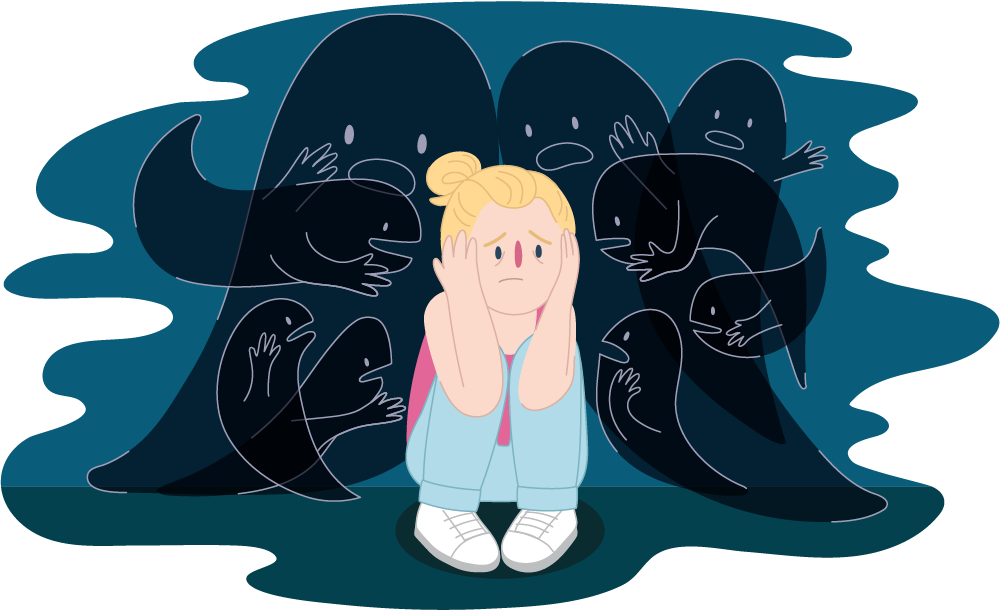Hearing voices and seeing things
What’s happening to me, am I going crazy? Worried about why you’re hearing voices or seeing things that aren’t there? We’re here to help.
Content Warning: this article contains information about mental health which may be distressing or triggering.

What are hallucinations?
Seeing things that aren’t there are one type of hallucinations.
Hallucinations are unusual experiences that change how you understand what is going on around you. Hallucinations may seem real, but they aren’t - it’s a bit like your brain is playing tricks on you, which makes you question your reality.
Hallucinations are sensory experiences, and can include:
- Hearing: bells, alarms, animal noises or voices inside or outside your head.
- Seeing: people, animals, objects, lights and shadows.
- Feeling: bugs or people touching you, gusts of wind, skin moving or intense temperature changes.
- Smelling: chemicals, rotting food, gasoline or smoke. Nice smells are less common!
- Tasting: bitter, salty or metallic tastes.
This doesn’t mean there’s something wrong with you.
It’s normal to feel a bit worried as hallucinations can be confusing and scary.
It’s important to know that hallucinations can happen for all sorts of reasons, and not always because of a mental illness. In fact, it's quite common for about 2 in every 3 young people to hear or see things that aren’t there at least once.

Real life experiences of hallucinations
Here’s what young people had to say about their experiences of hallucinations.
When we asked you about hearing voices and 83% of you said it was a negative experience.
Others shared they weren’t bothered, either because the voices went away or because they found them comforting and helpful. In some cultures and religions, hearing, seeing or feeling things is even considered normal and may be seen as a spiritual sign that you are connected with something more important!
Hallucinations or something else?
Whilst hallucinations involve experiencing something that is not real, illusions are an actual sensory experience that your brain misinterprets.
For example, an illusion might be thinking the garden hose is a snake, but a hallucination might be seeing a snake at your feet when there’s nothing there.
Having an ‘inner voice’ might feel like an auditory (hearing) hallucination because you can hear your voice or other people’s voices! It might look like ‘negative self-talk’ (e.g., “I hate myself”) or imagining conversations that include other people.
Intrusive thoughts are those annoying and disturbing ideas that keep popping into your mind, even if you don't want them there. It can sometimes feel like they aren’t your own thoughts or that someone is telling you to do something you don’t want to do.
Why am I hallucinating?
People experience hallucinations for many reasons. Let’s take a look at some:
A lack of sleep. Not getting enough sleep means your brain is working without enough breaks. When you brain is working too hard it can get confused or make things up.
Hypnagogic hallucinations are like a dream where you might hear, see or feel things when you're falling asleep or waking up. These usually go away when you're fully awake.
Stress or anxiety can affect the way your brain works and how you understand what happens around you.
Physical illness. Hallucinations can sometimes be a symptom of illness, e.g., fever, dehydration or exposure to toxins such as a gas leak in the home.
Migraines can cause you to see changing lights and shadows or see things not quite right (because of blurry or wobbly vision).
Substances. The use of drugs, alcohol, medications and other substances might have side effects that cause hallucinations.
Grief or death of a loved one. When someone special to you is gone, you might feel like they're still with you, hear their voice or feel them nearby.
Abuse, bullying and trauma. 80% of hallucinations start after traumatic life events. The hallucinations might remind you of the unkind things that were said or the bad things that happened.
Mental health disorders – like psychosis, schizophrenia, bipolar disorder or PTSD can cause hallucinations.
Green, Beige or Red Flags
How to tell the difference between ‘safe’ or potentially problem hallucinations.
Hallucinations can be a natural part of development and be caused by normal brain functioning. For example, having an imaginary friend as a child is a green flag as it is a normal part of child development, and hallucinating because of a lack of sleep is a beige flag if it goes away after you sleep!
However, hallucinating can also be cause for concern. Infact, experiencing hallucinations can make some people feel suicidal and increase your risk of suicidal thoughts and/or attempts, even without a mental health diagnosis.


Warning signs
It’s time to get help if...
- Hallucinations start suddenly: if you have never hallucinated before.
- Hallucinations start after taking substances: if the hallucinations happen after you’ve started a new medication or tried substances like alcohol or drugs.
- You also have other health symptoms: like migraines, fevers or infections. Weird sensations like vision loss or ringing in the ears can also be warning signs.
- It affects your daily life: if the hallucinations make it hard to do everyday things like going to school, hanging with friends or sleeping.
- It causes distress: if the hallucinations make you feel scared or uncomfortable.
- You want to harm yourself: if the hallucinations tell you to harm yourself or others, or make you feel unsafe.
- It’s intrusive: like unwanted thoughts that can be related to self-harm.
- It keeps happening: if the hallucinations happen all the time and just will not go away.
If you think you are experiencing any of these red flags, it’s important to reach out for help. Try booking an appointment with your GP, meeting with your teacher or talking with your friends, family or us, Kids Helpline.
Coping with hallucinations
It can be frightening and confusing to hear things that others don’t. Here are some things that might help:
Help! My friend or family member hears or sees things that aren’t there
If you know someone experiencing hallucinations, it might be confusing or upsetting for you, and you might not know how to help them.
Here are some things you can do to support them:
- Believe that what they're experiencing is real for them. Just like how you have your own unique experiences, they have theirs - and hearing, seeing or feeling things is part of that.
- Don't make judgments. Sometimes people don't talk about their experiences because they're worried that others won't understand or might think they're crazy. Let them know you care and won't judge them for it.
- Ask if there are triggers (certain things or situations that make the hallucinations happen more). This way, you can help them avoid those situations or be ready to support them.
- Remember they're still the same person you care about! Hallucinating doesn't change who they are inside.
- Support them to get help if the hallucinations are severe, cause distress, interfere with their everyday life, they’re unsafe – or you’re just worried about them.

"Hearing voices was really scary. I could barely tell anyone – I was so scared. My dad took me to a counsellor and that really helped me feel in control again." – Brad, 16 years old
You don’t have to cope on your own
Telling someone and getting support can make a difference
You might be feeling scared or embarrassed to ask for help, but talking to someone about what you’re going through can really help.
We're here to talk about anything. Give us a call or start a WebChat with us today.
If you are looking for more digital services and resources, check out Head to Health.
Check these out too:
All about schizophrenia
Let’s look at what schizophrenia is, and how to cope and ...
READ MESupporting someone with schizophrenia
If you know someone with schizophrenia or experiencing psychosis and don’t ...
READ MEI'm thinking about suicide
When people have overwhelming feelings of wanting to end their life it ...
READ MEAll about depression
Depression is more than just feeling sad. It's a mixture of thoughts, ...
READ METalking helps! We’re here for you.
No problem is too big or too small.
We're here 24 hours a day, 7 days a week






